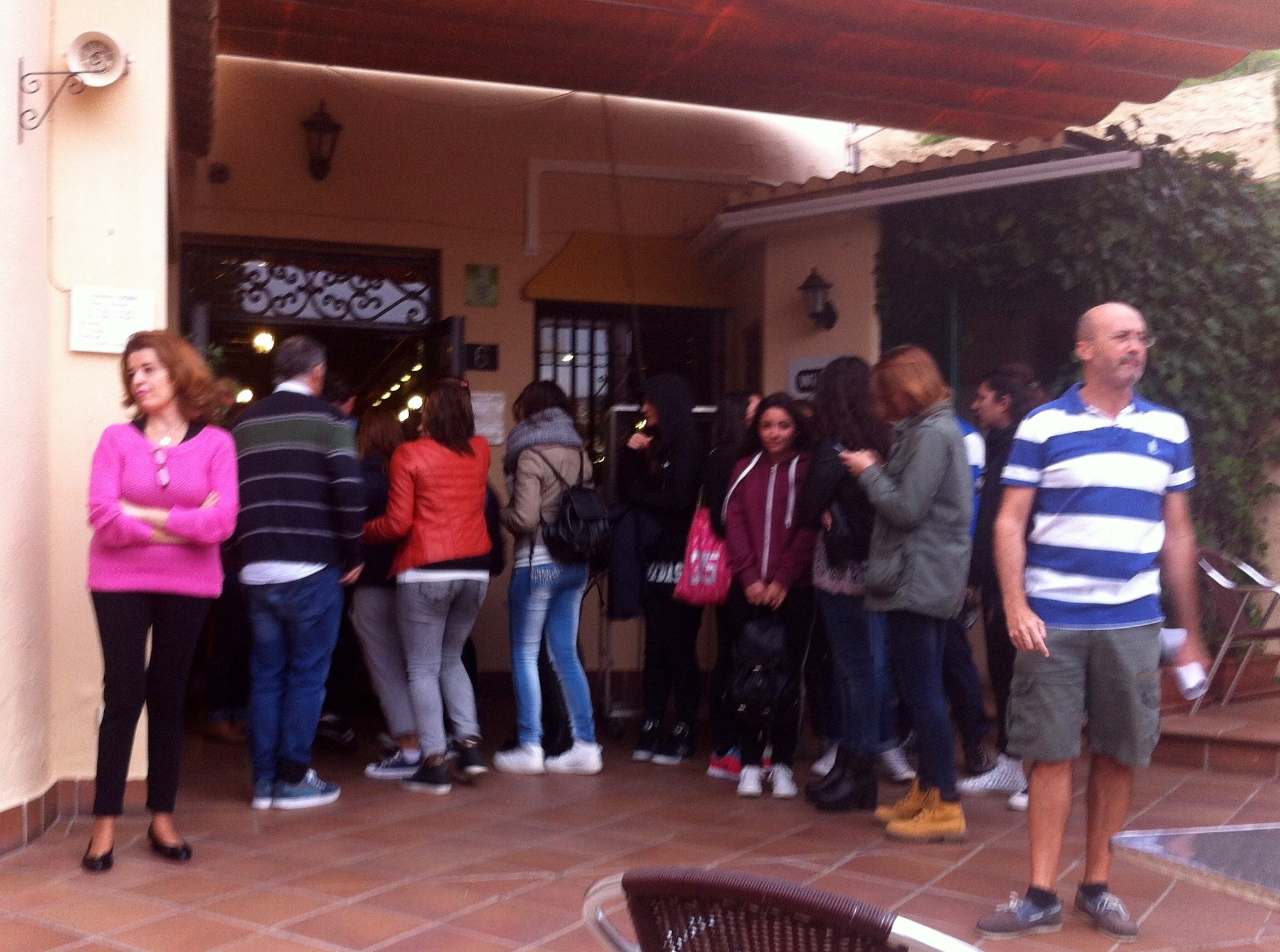Mostly, the whole experience of doing exams is almost forty years behind me. And the Spanish GCSE, taken in 2011 at Poole Adult Education Centre, was a walk in the park. But this DELE Spanish exam is no joke. It's the internationally accepted standard, so they have to be rigorous. I wrote last week about the oral exam in "Testing Times". Two days later we all returned to Málaca Institute for the main ordeal, three more exams - reading comprehension, listening comprehension, and writing.
About 70 students gathered in the dining hall. The co-ordinator slowly and clearly explained what would happen during the morning. There were students taking exams at all six levels of DELE. First, the two nervous-looking  Japanese girls were taken off to a small classroom to do the introductory level, A1. Seven filed off to another room to do A2. He skipped us B1 people as we were the largest group. One lone and brainy-looking student was called up to do the highest possible level, C2, and we applauded him as he was led out. Four more to do C1, so we clapped them too. That left us B-level folks. B2, ahead of us, and about 20 went off, accompanied by cries of "¡Suerte!" That left slightly over thirty to do B1, and we filed down to queue outside the biggest classroom downstairs. Our names were called at the door, and each student sent to a pre-assigned desk. Passports checked again, so that we weren't sending a substitute Spanish friend on our behalf.
Japanese girls were taken off to a small classroom to do the introductory level, A1. Seven filed off to another room to do A2. He skipped us B1 people as we were the largest group. One lone and brainy-looking student was called up to do the highest possible level, C2, and we applauded him as he was led out. Four more to do C1, so we clapped them too. That left us B-level folks. B2, ahead of us, and about 20 went off, accompanied by cries of "¡Suerte!" That left slightly over thirty to do B1, and we filed down to queue outside the biggest classroom downstairs. Our names were called at the door, and each student sent to a pre-assigned desk. Passports checked again, so that we weren't sending a substitute Spanish friend on our behalf.
 Strict exam conditions. Nothing on the desk except a pencil and a biro. No drinks allowed, except bottled water to be kept on the floor. Final explanations given. Registration data confirmed, name and exam number. Papers distributed, and response papers pre-printed with our names. The clock ticked round. "Gira el papel" - turn your papers over (I remember that from 40 years ago!).
Strict exam conditions. Nothing on the desk except a pencil and a biro. No drinks allowed, except bottled water to be kept on the floor. Final explanations given. Registration data confirmed, name and exam number. Papers distributed, and response papers pre-printed with our names. The clock ticked round. "Gira el papel" - turn your papers over (I remember that from 40 years ago!).
It's comprehension. Five tasks. First, read 6 people's description of what they want to do on vacation, read ten adverts for holidays, and match them. Not bad (an obvious trap was easy to spot). Second, read a fairly complex text about the history of a radio station in Peru, and answer six questions. OK. Next read some radio announcements and answer questions on each one. Fine I think. Then read a difficult text about management styles in the workplace, with gaps, read ten text fragments, and choose six to fit into the gaps. Tough. Finally read a text with some prepositions missing (oh lord) and put the right one in. Evil. Seventy minutes whizz by, but there's time to finish and to transfer the answers from the rough paper onto the response sheet.
No break, other than a minute to stand up and stretch. Straight onto the listening. The part everyone dreads. Radio news items, fast but clear, and six questions. An interview with a restaurant owner / critic and some questions about what he says. Then a chat between two young Spaniards, unhelpfully recorded in a noisy street, with traffic noise drowning their words. I know I got at least one wrong, couldn't catch it on the first or second time of listening.
At last a break, for coffee and exchanging views on the dreadful listening exercises. Ah, it turns out that most people thought that Alejandro HAD said he'd been angry with Manolo in the street conversation. That's another point dropped. Then it was on to writing. A "blog post" about an object we remember from our childhood, and a long chatty reply to an email. An hour to make some rough notes then transfer them onto the official answer sheets. Not too bad. And then the exam is over. Daunting, challenging, exhilarating, and - yes - fun! I’d highly recommend the whole process to anyone serious about their language learning.
 The three month wait for the results feels cruel. But people all over the world were sitting the identical exam on the same day, and the marking has to be done, sampled, and then evaluated for even-handedness across all the participants. However, I set aside all thoughts of the exam, packed a bag and headed to Málaga airport for a fiendishly early morning flight to the UK for a week of visiting friends.
The three month wait for the results feels cruel. But people all over the world were sitting the identical exam on the same day, and the marking has to be done, sampled, and then evaluated for even-handedness across all the participants. However, I set aside all thoughts of the exam, packed a bag and headed to Málaga airport for a fiendishly early morning flight to the UK for a week of visiting friends.
A foot in two campos. Best of both worlds. Returning to Shaftesbury as it gears up  for Christmas. Walks in the stunning Dorset countryside. A brief visit to a Town Council meeting to express disappointment in the overturning of a public consultation. Lunch with Zara at Turnbulls Cafe and Delicatessen, dinner with chums, a day out with Jo (a friend for over half a century) at the Christmas Market by Winchester cathedral. A flying visit to London to see an aunt and uncle (along with some reminiscing, and a look at some fascinating old family papers found in the loft). Staying a couple of relaxing nights with other friends. Christmas presents distributed and received.
for Christmas. Walks in the stunning Dorset countryside. A brief visit to a Town Council meeting to express disappointment in the overturning of a public consultation. Lunch with Zara at Turnbulls Cafe and Delicatessen, dinner with chums, a day out with Jo (a friend for over half a century) at the Christmas Market by Winchester cathedral. A flying visit to London to see an aunt and uncle (along with some reminiscing, and a look at some fascinating old family papers found in the loft). Staying a couple of relaxing nights with other friends. Christmas presents distributed and received.

The exam is over. What next? Do I go on and study for B2? I know it's a big step up, with more complex grammar to study. I don't need to keep measuring my improvement against external standards. But "getting by" has never been good enough. Flying back to Málaga I leaf through some of the papers my uncle had loaned me. I open a British Film Institute book about my dad's work as a TV editor and producer. "Uncompromising in his quest for perfection, he set the highest standards for himself and for his crew. 'That'll do' was a phrase that would get you fired off a Tony Essex production." Hmmm. Looks like I may not have complete freedom of choice in the matter. I guess it's in the genes.
© Tamara Essex 2014 http://www.twocampos.com
THIS WEEK'S LANGUAGE POINT:
I've been noticing something about HOW people speak a learned language. There's a habit amongst some native English-speakers, of speaking Spanish as though they are acting, or "wearing" the Spanish language as some sort of external layer. By "acting", I mean that they appear to be acutely aware of speaking Spanish, and I have noticed this even amongst people with quite good grammar and vocabulary. Also, many folks in Spanish lessons, mid-sentence while speaking Spanish, pause and begin to comment in English about their thought processes. "Oh hang on, I'll get it in a minute" etc. For absolute beginners both these habits are natural, but in my opinion, both function as blocks to improvement.
It seems to me that to let go of the "awareness" and simply speak, even with mistakes, would be a big step towards sounding more fluid and natural. The constant reverting back to English, in lessons or in conversations with Spanish people, in my view subconsciously reinforces that the English language is their default position, and to some degree blocks progression. My teacher confirmed that, for example, my rambling search for the correct subjunctive form of a verb (in the oral exam) was perfectly acceptable because I rambled in Spanish, even though it took me five attempts to find the correct construction! However had I even once slipped in a "oh no, sorry, that's not right" in ENGLISH it would have led to significant points being deducted or straight failure.